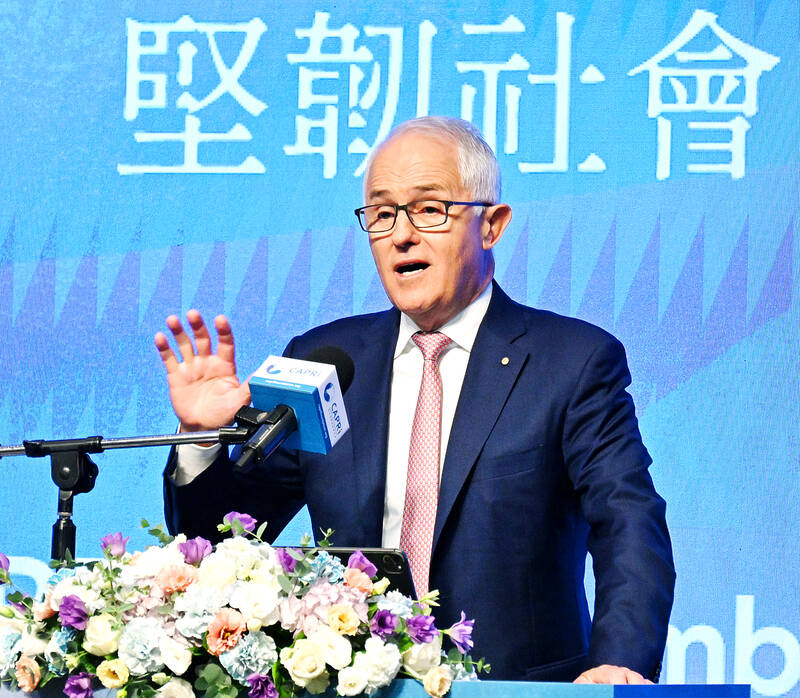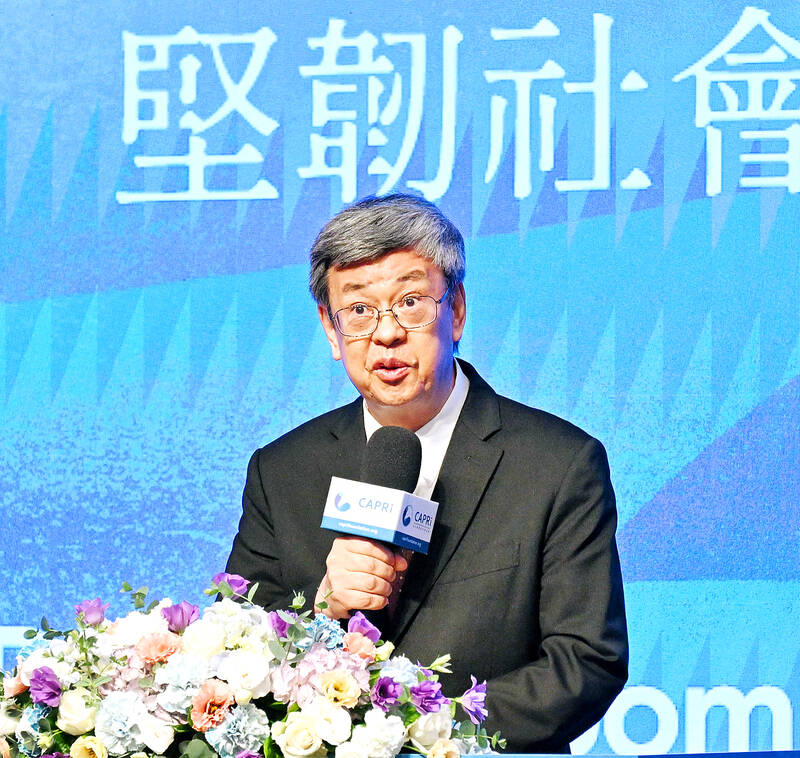The viewpoint of Taiwan is more important than ever for Asia-
Pacific democracies when facing current challenges, former Australian prime minister Malcolm Turnbull said in Taipei yesterday.
Turnbull made the remark in his keynote speech titled “Democratic Leadership in a Populist Age” at an annual forum hosted by the Center for Asia-Pacific Resilience and Innovation (CAPRI) think tank.

Photo: Fang Pin-chao, Taipei Times
The challenges posed by authoritarian governments are becoming more serious, but Russia’s invasion of Ukraine has made NATO stronger and the Western world more united in defending democracy, he said.
Ukrainians’ tenacious and courageous fight against Russia demonstrated that “democracies must support each other,” Turnbull said.
Democracies in the Asia-Pacific region should “ensure the strong does not do as they will,” and defend democracy and the right of nations to determine their own destinies free from coercion, he said.

Photo: Fang Pin-chao, Taipei Times
Another great threat to democracy is disinformation, spread by external forces and domestic conspiracy theorists, Turnbull said.
He warned against the dominance of social media, which has transformed the media landscape and made society more divided.
A diversity of voices helps reduce the risk of monopolies, but audiences in today’s world often only hear the voice most similar to their own and media are striving to capture their attention by presenting increasingly extreme views, Turnbull said.
To defend democratic resilience in the social media era, people need to “stand up for truth and call out lies for what they are,” which requires input from the government and responsible media organizations, he said.
Trust can be built on the foundation of truth and transparency, he added.
Turnbull, who serves as chair of CAPRI’s International Advisory Council, is making his first visit to Taiwan.
Premier Chen Chien-jen (陳建仁), in his speech at the forum, said that Taiwan demonstrated economic and industrial endurance during the COVID-19 pandemic, and continues to bolster the resilience of its economy, workforce and the environment.
Global challenges, such as the pandemic, climate change and the Russia-Ukraine war, “have made evident just how vulnerable and helpless national economies and global supply chains are in the face of sudden extreme risks,” Chen said.
To combat challenges beyond national borders, “we must all rely on working together with like-minded countries to adopt consistent and effective responses,” he said.
“Be prepared for danger in times of peace” is a motto Taiwanese live by, he added.
Despite being excluded from the UN system, Taiwan “has consistently fulfilled its responsibility as a member of the global village” by promoting the transition to net zero emissions, he said.
“Taiwan is glad to share its experience in post-pandemic national resilience-building with the global community,” and looks forward to working with international partners to promote resilience and prosperity, Chen said.

SECURITY: As China is ‘reshaping’ Hong Kong’s population, Taiwan must raise the eligibility threshold for applications from Hong Kongers, Chiu Chui-cheng said When Hong Kong and Macau citizens apply for residency in Taiwan, it would be under a new category that includes a “national security observation period,” Mainland Affairs Council (MAC) Minister Chiu Chui-cheng (邱垂正) said yesterday. President William Lai (賴清德) on March 13 announced 17 strategies to counter China’s aggression toward Taiwan, including incorporating national security considerations into the review process for residency applications from Hong Kong and Macau citizens. The situation in Hong Kong is constantly changing, Chiu said to media yesterday on the sidelines of the Taipei Technology Run hosted by the Taipei Neihu Technology Park Development Association. With

CARROT AND STICK: While unrelenting in its military threats, China attracted nearly 40,000 Taiwanese to over 400 business events last year Nearly 40,000 Taiwanese last year joined industry events in China, such as conferences and trade fairs, supported by the Chinese government, a study showed yesterday, as Beijing ramps up a charm offensive toward Taipei alongside military pressure. China has long taken a carrot-and-stick approach to Taiwan, threatening it with the prospect of military action while reaching out to those it believes are amenable to Beijing’s point of view. Taiwanese security officials are wary of what they see as Beijing’s influence campaigns to sway public opinion after Taipei and Beijing gradually resumed travel links halted by the COVID-19 pandemic, but the scale of

A US Marine Corps regiment equipped with Naval Strike Missiles (NSM) is set to participate in the upcoming Balikatan 25 exercise in the Luzon Strait, marking the system’s first-ever deployment in the Philippines. US and Philippine officials have separately confirmed that the Navy Marine Expeditionary Ship Interdiction System (NMESIS) — the mobile launch platform for the Naval Strike Missile — would take part in the joint exercise. The missiles are being deployed to “a strategic first island chain chokepoint” in the waters between Taiwan proper and the Philippines, US-based Naval News reported. “The Luzon Strait and Bashi Channel represent a critical access

Pope Francis is be laid to rest on Saturday after lying in state for three days in St Peter’s Basilica, where the faithful are expected to flock to pay their respects to history’s first Latin American pontiff. The cardinals met yesterday in the Vatican’s synod hall to chart the next steps before a conclave begins to choose Francis’ successor, as condolences poured in from around the world. According to current norms, the conclave must begin between May 5 and 10. The cardinals set the funeral for Saturday at 10am in St Peter’s Square, to be celebrated by the dean of the College